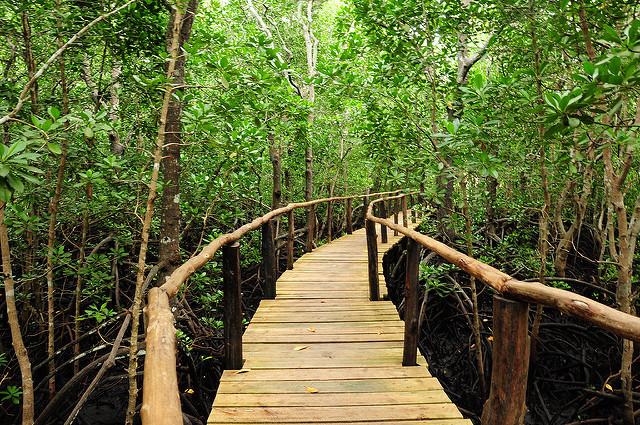
Zanzibar is known as the Spice Island, the beautiful island of Zanzibar on Africa’s east coast is bursting with culture and history, seemingly at odds with its idyllic geography of white-sand beaches with palms swaying lazily in the sea breeze. Together this makes Zanzibar a fabulous place to explore as well as a dream to relax and unwind.


Please read the following terms and conditions. They limit our liability and outline the conditions under which your tours will operate. Acceptance of tour documents represents an acceptance by the customer of the terms and conditions as follows:
A deposit of 20% of the total tour price is due at the time of making your reservation. The balance is due no later than 30 days prior to departure. We reserve the right to cancel any reservations for which the total fare has not been paid by the due date. In such cases the deposit paid will be forfeited. Only upon receipt of all deposits from all parties travelling will the tour be confirmed. All items included within a proposed itinerary are subject to availability at the time of deposit receipt.
The following cancellation charges will apply:
Please note that in cases where bookings have been made for external services such as accommodation, the cancellation charges incurred are the responsibility of the client. Please ensure that you are aware of such external bookings when making a reservation with us. Cancellations must be done in writing via email.
We do not charge an administrative fee for changes you make to an itinerary prior to due date of full payment. We will do our utmost to make changes as you request but we cannot guarantee that this will be possible as changes are subject to availability. If the client wishes to make changes after the payment has been received in full, we cannot give guarantees that this will be possible. Some changes in itinerary may be subject to surcharge. Once the proposal is confirmed and we have made firm bookings on your behalf, we reserve the right to refuse to make alterations to the itinerary.
Prices quoted are based on costs and exchange rates at time of compilation of quote. A surcharge may be necessary should there be significant changes in the following circumstances: (a) Transportation costs including the cost of fuel. (b) Dues, taxes (including road taxes and tolls) or levies charged by the governments or their agencies. (c) Exchange rate
We reserve the right to vary, modify or cancel any itinerary, either part or wholly. If this is necessary, we will substitute alternative arrangements of comparable value, or at our discretion provide a full refund.
Under no circumstances can we be held responsible for weather conditions, nor can any ticket be cancelled or amended by you at any time on the basis of weather conditions.
All tour prices quoted include transportation, accommodation, meals and entrance fees, as stipulated in our itineraries. Prices advertised on the site are subject to change, and will only be fixed upon payment of the deposit.
Please check with a local Travel Agent regarding requirements for passport and visas. Generally a tourist visa will be required for visits to the country of no longer than 3 months. Requirements and prices vary by country.
It is strongly advised that you consult your doctor or local health department at least 8 weeks prior to departing your country of origin. Yellow Fever cards may be required at a port of entry to Tanzania.
We reserve the right to make, with or without notice, alterations to, accommodation, meals, vehicles, schedule, or planned route should the need arise. Every effort will be made to consult and inform the client of any such changes prior to the beginning of the tour.
Luggage is limited to 15 kg per person.
Insurance is not included and it is, therefore, strongly recommended that you obtain personal travel and medical insurance policy before departing your country.
We do not accept liability for injury, damage of personal property, loss of personal property, accident, delay, or irregularity caused by either defect in any vehicle the actions of any persons associated with the tour, accommodation, establishment, or employees.
Travel insurance is required to participate on this trip. Trip deposits are non-refundable and balance payments are only partially refundable. Therefore, it is prudent for you to protect your investment against trip cancellation, interruption, delays and unforeseeable expenses. Standard travel insurance provides coverage for:
At a minimum, the insurance should protect you against trip cancellation and trip interruption, should you need to cancel your trip due to circumstances such as training injuries or sickness or emergencies. Ideally, insurance should cover high altitude trekking (not to be confused with “mountaineering” or “mountain climbing” which most insurance will not cover) and all medical and repatriation costs.
You are responsible for bringing personal gear and equipment while communal equipment (tents, food, cooking items, etc.) is provided. Below is a gear list of required, recommended and optional items to bring on your climb.
*MAY BE RENTED ON LOCATION
Be selective in what you take with you. Please note that our porters are limited to carrying 33 lbs (15 kgs) of your personal belongings. Everything the porters will carry for you between campsites should be placed into the duffel bag, including the sleeping bag, but it is OK to pack the sleeping bag separately if necessary.
Our porters will place your duffel bag and sleeping bag into a large, sturdy, waterproof bag with a roll-top closure
If you have excess weight, you will be required to hire an additional porter.
Plastic, recyclable water bottles are not allowed in the park, due to past problems with litter. So water should be carried in Nalgene bottles, water bladders, or similar devices. You should be able to carry 3-4 liters of water with you at all times. Please do not bring alcohol. It is illegal to have alcohol in the park. Our staff will not carry it for you. Besides, drinking and high altitude do not mix well.
Checked luggage on airplanes can get lost or delayed on the way to Tanzania. You should prepare for this possibility by wearing or carrying on the items that are essential to your Kilimanjaro climb. While most clothing, gear and equipment can be replaced in Tanzania prior to your climb, there are some things that you should not replace.
Mooh Tour Safar recommends that you wear one complete hiking outfit on the plane, including a long sleeve shirt, hiking pants, underwear, socks, and hiking boots. In your carryon baggage, you should bring your backpack, waterproof jacket and pants, insulated jacket, fleece pants, snacks, toiletries, medications, camera and all paperwork. Airline regulations do not allow you to carry trekking poles on the plane. Make sure you do wear/carry your hiking boots; wearing a different pair of boots on your climb will likely cause blistering.
If your baggage is lost or delayed, please notify us immediately upon your arrival so we can assist you in assembling the necessary gear. We will take you to local, independently owned rental gear shops in Moshi. Note that these shops generally carry second-hand items that may not be up to Western standards. We cannot guarantee the fit, quality or functionality of items found in local shops. Therefore, we strongly encourage you to carry on the most important pieces of gear as noted above. We will make reasonable attempts to deliver delayed luggage to you on the mountain. All additional expenses that are incurred by us while resolving lost or delayed luggage problems must be reimbursed.
Before climbing Mt. Kilimanjaro, most climbers often start worrying about the porter and guide’s tip before the climb starts. They want to know how much it will affect their budget, and to make sure they are paying a good tip. Mooh Tour Safar philosophy is just like service in a restaurant, a climbing tip should only be given if you received good service from us. A typical porter on a seven day climb should receive around a $40 tip; a cook could receive about $80; and a head guide could receive $100 or more. These tips are divided by the total number of people in the group, not per person.
A general estimate, for your budget, per Kilimanjaro climber runs from about $175 to $250 per person depending upon the following factors: the number of people in your group, the number of the porters, number of guides, cooks and sometimes the route. It’s impossible to predict an exact tip in advance because it really depends upon how much gear is brought up the mountain and how much weight is brought up the mountain. There is no a de facto standard of tipping for all companies, it’s only a recommendations from organizations, NGOs and the Tanzanian government. Some higher-end companies have seen tips in excess of these recommendations. Some budget companies have seen tips lower than this.
Please Note: Tip amounts listed for Kilimanjaro and safari are per group, not per individual traveler. For instance, if four people are on safari, they should each contribute $5/day if they want to tip the driver.
Most travelers require a travel visa to visit Tanzania. While travel visas can be obtained at the airport upon arrival, we recommend getting your visa ahead of time to avoid waiting in line.
Your passport must be signed with at least six months of validity when you enter Tanzania.
Additional documentation (i.e. proof of vaccination) may also be required based on where you are travelling from.
Afghanistan, Azerbaijan, Bangladesh, Chad, Djibouti, Ethiopia, Equatorial Guinea, Eritrea, Kazakhstan, Kyrgyzstan, Lebanon, Mali, Mauritania, Niger, Palestine, Senegal, Somalia, Sierra Leone, Tajikistan, Turkmenistan, Uzbekistan, and Sri Lanka.
Anguilla, Antigua and Barbuda, Bahamas, Barbados, Belize, Bermuda, Botswana, British Virgin Islands, Brunei, Cayman Islands, Cyprus, Dominica, Falkland Islands, Gambia, Ghana, Gibraltar, Grenada, Guernsey, Guyana, Hong Kong, Jamaica, Jersey, Kenya, Kiribati, Lesotho, Malawi, Malaysia, Morocco, Mozambique, Namibia, Nauru, Papua New Guinea, Romania, Rwanda, Samoa, Seychelles, Singapore, South Africa, Swaziland, Tonga, Trinidad and Tobago, Turks and Caicos, Tuvalu, Uganda, Vanuatu, Zambia,and Zimbabwe.
You’ll need proof of the Yellow Fever vaccination if you are a citizen (or travelling from) these countries:
Angola, Argentina, Benin, Bolivia, Brazil, Burkina Faso, Burundi, Cameroon, Central African Republic, Chad, Colombia, Republic of the Congo, Democratic Republic of the Congo, Côte d’Ivoire, Ecuador, Equatorial Guinea, Ethiopia, French Guiana, Gabon, Gambia, Ghana, Guinea, Guinea-Bissau, Guyana, Kenya, Liberia, Mali, Mauritania, Niger, Nigeria, Panama, Paraguay, Peru, Rwanda, Senegal, Sierra Leone, South Sudan, Sudan, Suriname, Togo, Trinidad and Tobago, Uganda, and Venezuela.
